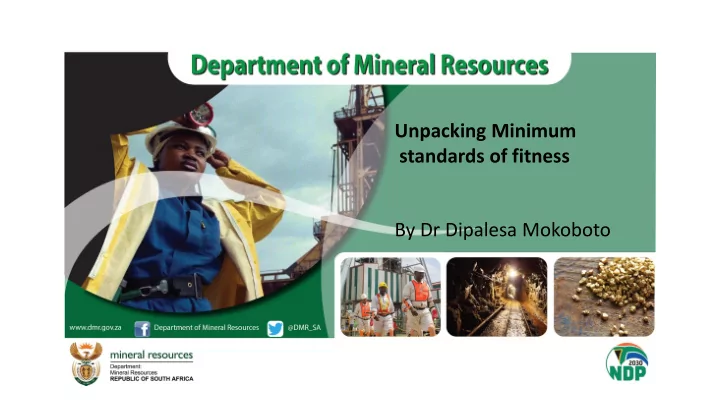

Unpacking Minimum standards of fitness Photo Album by Msizi Nyalungu By Dr Dipalesa Mokoboto
Outline • Introduction • Minimum standards of fitness • Legislative framework to consider • OMP considerations • Medicolegal considerations • Principlism • Case law • Case studies • Take home message • Conclusion
INTRODUCTION • Drafted to assist OMPs -fitness to work • Outlines common approaches • Not meant to be prescriptive • OMP allowed to introduce other approaches • To be supported by evidence-based clinical trials/medical association • OMP determines fitness to work • Should be familiar with requirements of jobs
CONSIDER OTHER LEGISLATIVE FRAMEWORK The Mine Health and Safety Act 29 of 1996- further influenced by : • Labour relations Act 66 of 1995-regulates fair dismissal of employees. • Basic conditions of Employment Act 75 of 1997-conditions of all employees-particularly shifts and pregnant women) • Employment equity Act -restrictive in terms of testing-(e.g. HIV tests prohibited unless justifiable by labour court) • Q: Is it ethical to conduct CD4 test in lieu of HIV test???
• Risk management principles — consider work exposure • Each case to be evaluated on its own merit- No two cases the same • No blanket exclusions for employees with certain conditions.(DM) • Consider specific risks for specific jobs- don’t generalise(plant e.g.) OMP • Consider specifics of med. Condition and working CONSIDERATIONS environment • Medical condition interpreted in functional terms and WHEN DETERMINING job requirements • Medical ethics and relevant legislation incl. case law FTW
• Medical ethics not separate from law ---intrinsically interwoven • Ethical duty may also be a legal obligation • Part & parcel of the traditional doctor-patient relationship • Ethical obligations depicted in national & international codes(ICOH) MEDICOLEGAL • Enforced by professional bodies(e.g. HPCSA booklet 1) • Beauchamp-Childress model on principlism- CONSIDERATIONS prominent
PRINCIPLISM 1 Respect for autonomy- • informed consent; confidentiality, truth telling corresp to legal positions – the Constitution. sections 10(dignity);12(2)(b) bodily intergrity;14 (privacy). ?? paternalistic 2. Beneficence (doing good); protect and defend the rights of others — do we? prevent harm from occurring to other-may lead to maleficence help persons with disabilities- do we?
PRINCIPLISM Non-maleficence • doing no harm- • Not depriving others the goods of life- Justice • Fair treatment of employees • Respect for human rights • Respect for morally accepted laws
RELEVANT CASE LAW • Applicant denied job as firefighter – IDDM IMATU v • OMP stated that applicant posed a safety risk to self and others • Expert witness was sought- rxd applicant for 20years city of • Fears of employer overcautious and unnecessarily restrictive • Applicant last had hypo at 10years, after diagnosed cape town • Diabetics not invalids- should not be discriminated against • NIDDM more hypo-less controlled and poorly managed • Applicant was model diabetic px- well controlled
CASE LAW 1 • An optimally controlled IDDM -less risk than IMATU v • An undiagnosed or poorly managed NIDDM • Controlled diabetics seek dignity-capacity to city of function normally • Modern pharmacol and techno makes this possible cape town • Blanket ban constituted unfair discrimination- CC Decision
CASE LAW2 McLean v • “40] … … for there to be true SASOL Mine individualization, a close assessment should be made of the individual in question since even (Pty) LTD persons with the same disability vary markedly in how they personally function and cope with their Secunda affliction, or vary in the degree of impairment because of different stages of their infirmity.” Colliery / ….:
CASE LAW 3 CC judgment in • individualised assessment, rather than Hoffmann v SA a blanket ban, should be followed Airways (2000 ILJ • In cases where the employer seeks to 2357 (CC)) where differentiate on health grounds the court • in an employment policy or practice. confirmed:
Case Studies
Relevant case studies demonstrating case law case studies.docx
TAKE HOME MESSAGE 1.Remember the Constitution- Bill of rights • Of importance: • Right to- dignity; cornerstone of our Constitution( J Ackerman) • Right to equality; full and equal enjoyment of all rights • Right to fair labour practice: no discrimination for certain conditions ; right to reasonable accommodation(
TAKE HOME MESSAGE Consider update .Remember case Consider cases on case law by law discussed Peter Strasheim Do not abuse – 2. Remember e.g sending an employee who is RFA still sick for RFA 3. Guideline not Consider other only tool to legislation and determine medical ethics fitness
CONCLUSION • Minimum standards of fitness guideline cant be used in isolation • Need to revise the guideline • Advance in medicine and technology to be considered
Recommend
More recommend